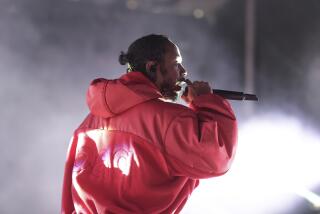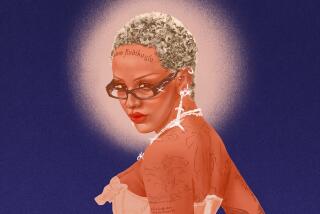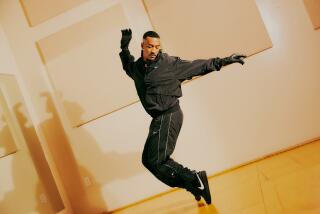Dispelling the bad rap with ‘Freestyle’
Hip-hop gets a bad rap (pun intended) at least in part because its perception by the mainstream is either that of the thug-life, gangsta types who become movie stars and often end up dead, or the slick, corporate-packaged, TV-friendly musicians who dominate the pop charts.
The fine documentary “Freestyle: The Art of Rhyme” puts a different spin on the scene, concentrating on the improvisational, generally unrecorded genre of hip-hop in which MCs spontaneously spew mad, rhythmic streams of language that disappear into the ether. Accompanied by DJs laying down 4/4 beats or other rappers pounding out propulsive bass lines a cappella, these artists pursue a Zen-like quest to be in the moment.
Director Kevin Fitzgerald, a.k.a. DJ Organic, focuses on the creative and cultural aspects of freestyle, wisely letting the rappers -- for the most part -- do the talking, both in interviews and rhymes.
The stars of the freestyle world, while less well known than their multiplatinum CD-selling brethren, earn their fame not from being in heavy rotation on MTV but from their ability to rhyme “off-the-head,” creating a verbal bob-and-weave that would make Muhammad Ali proud. Sometimes banal, sometimes inspired, the raps spring from what is immediately before them or from topics shouted out by others.
The film itself is something of an improvisation, shot over 10 years by Fitzgerald and his fellow filmmakers and changing shape each time it’s shown. Since freestyle is constantly evolving -- innovation is considered the apex of the form -- Fitzgerald is continuously updating the film. The director mixes interviews and raps, and some of the interviews become raps by way of demonstration, with archival footage dating back to the 1950s.
For such a free-form approach to filmmaking, “Freestyle” is surprisingly well structured. Fitzgerald deftly traces hip-hop’s roots from fiery Southern gospel preachers and Jamaican toasters to its beginnings in the ‘70s. The Jamaican influence arrived via immigrants to the South Bronx. Another key piece of the puzzle came from the Last Poets, an influential group of African American activist poets and musicians in the late ‘60s and ‘70s. One of the members, Abiodun Oyewole, along with jazz historian Eluard Burt, contributes essential commentary in drawing parallels from the past to the present.
The two most common formats freestyle takes actually symbolize its strengths. The one-on-one confrontational battles -- in which MCs try to top one another both through outright dissing and by elevating the level of the rhymes -- are demonstrated through footage of legendary word wars between rapper Supernatural and rivals Craig G and Juice. There is an underlying rage to these verbal conflicts, but proponents of freestyle say it beats the extreme violence found on the other side of hip-hop.
Interviewees discuss the healing effect that comes from the release of channeling the artist’s personal and political frustrations into the rhymes. The film draws an analogy to the improvisational wrath of John Coltrane’s jazz saxophone solos.
The most intriguing manifestation of freestyle is the cypher. A tight circle where multiple rappers build upon one another’s rhymes, the cypher harnesses the energy of the community. The unedited streams sometimes flame out into silliness, but someone’s always there to pick up the slack.
Even if you have no previous interest in or extensive knowledge of hip-hop, “Freestyle” will draw you in, accomplishing that rare feat of making the creative process interesting while also telling a story. The narrative is far from linear, but Fitzgerald skillfully lays down his own beat while documenting this underappreciated form.
*
‘Freestyle: The Art of Rhyme’
MPAA rating: Unrated.
Times guidelines: Strong language.
A Hip-Hop Film Festival and Center for Hip-Hop Education presentation of an Organic Films production. Director Kevin Fitzgerald a.k.a. DJ Organic. Producers Henry Alex Rubin, Kevin Fitzgerald, Charles Raggio. Executive producer Tiare White. Cinematographers Todd Hickey, Daniel Kozman, Brian Bellamy. Producing editor Paul Devlin. Music score Dark Leaf, DJ Organic, Omid. Running time: 1 hour, 12 minutes.
Exclusively at Laemmle’s Fairfax Cinemas, 7907 Beverly Blvd., L.A.; (323) 655-4010. An open microphone and a cypher will be held after each screening.
More to Read
Only good movies
Get the Indie Focus newsletter, Mark Olsen's weekly guide to the world of cinema.
You may occasionally receive promotional content from the Los Angeles Times.











